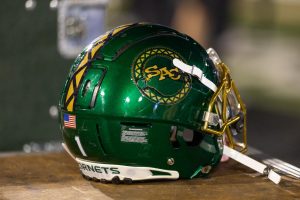Tsunami program receives small audience
January 29, 2005
Chairs remained empty in the University Union’s Ballroom on Thursday when only a few people attended the Multi-Cultural Center’s Tsunami Program that started at 10 a.m. and lasted all day.
Leonard Valdez, director of the Multi-Cultural Center, said he blamed the poor turn out on classes and the business associated with the start of the semester.
“It’s a tough time of year,” Valdez said.
Although there had been a steady flow of people coming up to their booths to look at facts about the tsunami and volunteer for future tsunami-related events, Valdez said, the center was unable to use their speakers with such a small amount of people.
However, the program’s turn out did not discourage Valdez.
“That’s not the point,” he said. “The point is to honor the dead and the living.”
The center plans to hold more events related to its Tsunami Program.
“This one-day event is not the end of it,” Valdez said.The center stuck to its schedule and released doves at the start of the event on the outside stage behind the Ballroom.
Over 15 doves flew into the air after ceremonial lines were read honoring the victims of the tsunami.
Valdez said the center was able to use some of the money given to them by Associated Students Inc. for organizations on campus to purchase the doves.
Barbara Bush, a representative for the Sacramento Sierra Chapter of the American Red Cross showed up to the event shortly after the doves scattered into the sky.
The organization wasn’t accepting donations when students visited its booths.
“Normally the Red Cross helps out immediate needs but this time it’s looking at long-term issues,” Bush said.
Instead, Bush said the organization wanted to explain to people on campus and in the community where their donations go and what is being done in the tsunami-damaged region.
“We’ve already had generous donations so our long terms plans are now a viable option,” Bush said.
Prit Paul Kaur, a senior lecturer whose originally from India and also one of the speakers planned for the program, said she was pleased to see the Multi-Cultural Center’s efforts in supporting the tsunami victims.
“It’s really good,” she said. “This is the kind of support that is expected from a cultural calamity.”
But Kaur said the region needs more than just donations and ceremonies.”This (event) is reactive and we should go towards a proactive approach,” she said.
Kaur said she wants Southeast Asia to have things like a tsunami warning system since people were sleeping when the wave came.
“We should try and control that,” she said.Marlyn Jones, an assistant professor in the criminal justice department, was one of the people walking past the booths.
Jones said she knew Port Royal in Jamaica sank as a result of the tsunami and wants to see the region start thinking about the potential of being proactive.
“Because it happened before, it can happen again,” Jones said.
The center plans to still go through with the ceremonial burning along with other tsunami-related events sometime during the semester.




























































































































